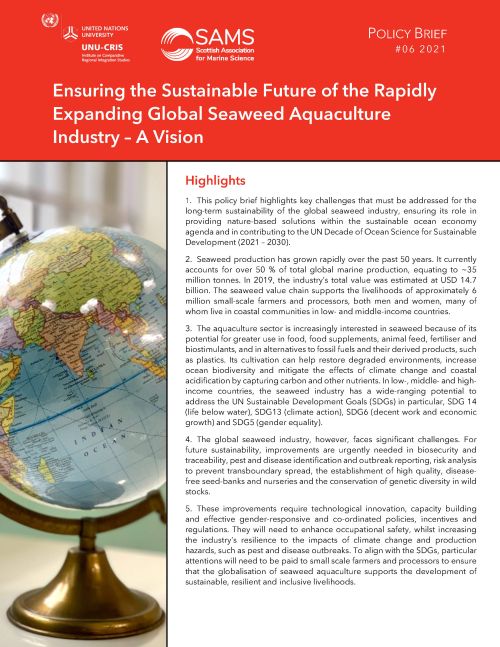Policy brief on “Ensuring the Sustainable Future of the Rapidly Expanding Global Seaweed Aquaculture Industry – A Vision”
19 November 2021 | | Aquatic plants

A policy brief on “Ensuring the Sustainable Future of the Rapidly Expanding Global Seaweed Aquaculture Industry – A Vision” authored by 37 experts from 30 organisations worldwide was published by the UNU Institute on Comparative Regional Integration Studies on 10 November 2021. The policy brief highlighted the key challenges that must be addressed for the long-term sustainability of the global seaweed industry, ensuring its role in providing nature-based solutions within the sustainable ocean economy agenda and contributing to the UN Decade of Ocean Science for Sustainable Development (2021 – 2030).
The policy brief acknowledges that seaweed production has increased 15 fold over the past 50 years. The industry produces an equivalent to about 35 million tonnes fresh weight, about 51% of the world’s mariculture production, with a total value estimated at USD 14.7 billion. The seaweed value chain supports the livelihoods of about 6 million small-scale farmers and processors. NACA member states such as China, Indonesia, the Philippines, and Malaysia produce the majority of farmed seaweeds in the world. Farmed seaweed is used in food, food supplements, feed, fertilisers, and biostimulants, as well as substitutes for fossil fuels and their derivatives. Moreover, seaweed farming benefits restore degraded environments, enriches biodiversity, and has potential to contribute to mitigation of the effects of climate change and coastal acidification. The seaweed industry has broad potential to address the UN SDGs.
The policy brief warns that the global seaweed industry faces significant challenges for future development. Socio-economically, a pest or disease outbreak can have devastating economic consequences on farmers, families, and their wider communities. The policy brief provided recommendations to balance economic profitability with the environment, human needs and health. The policy brief emphasised the sustainable seaweed industry requires effective biosecurity and genetic diversity from its analysis. It indicated that the introduction and spread of seaweed pests and disease poses a major and increasing threat to production. The movement of live seaweeds is acknowledged as a major vector. Introduced non-indigenous macroalgae can also alter ecosystem structure and function. As the global seaweed aquaculture industry grows and diversifies, the risk of introducing known and emerging pests and diseases to the new regions will escalate. National dependence on introduced seaweeds and their cultivars from other countries and regions, whenever possible, should be reduced.
The report makes policy recommendations for promoting wider environmental, gender-responsive and socially inclusive approaches to upscaling the seaweed industry, which includes:
- Developing clear international seaweed-related policies and regulations to improve biosecurity and genetic diversity.
- Developing global, regional, and national technology transfer and capacity building initiatives, focusing on biosecurity and genetic diversity.
- Developing regional and national seed stocks and biosecure nurseries.
- Maintaining the genetic diversity in wild stocks.
- Further developing assessment tools for balancing environmental and economic risks with the potential benefits of seaweed production.
- Incentivising the integration of seaweed production with other extractive and fed-aquaculture species and maritime activities.
- Channel support for long-term investments to promote the beneficial aspects of the industry.
- Establish international seaweed research networks to conduct further innovative, interdisciplinary research spanning the natural and social sciences.
The policy brief team was led by Prof. Elizabeth J. Cottier-Cook from Scottish Association for Marine Science, UNU Associated Institution, Scottish Marine Institute. Eight organisations from six NACA member states and the Secretariat were involved in the policy brief team.
Creative Commons Attribution.